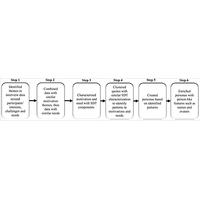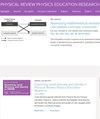Motivation and needs of informal physics practitioners
IF 2.6
2区 教育学
Q1 EDUCATION & EDUCATIONAL RESEARCH
Physical Review Physics Education Research
Pub Date : 2024-04-11
DOI:10.1103/physrevphyseducres.20.010125
引用次数: 0
Abstract
Physicists engage with the public to varying degrees at different stages of their careers. However, their public engagement covers many activities, events, and audiences, making their motivations and professional development needs not well understood. As part of ongoing efforts to build and support a community in the informal physics space, we conducted interviews with physicists with a range of different experiences in public engagement. We use personas methodology and self-determination theory to articulate their public engagement motivation, challenges, and needs. We present our set of three personas: the physicist who engages in informal physics for self-reflection, the physicist who wants to spark interest and understanding in physics, and the physicist who wants to provide diverse role models to younger students and inspire them to pursue a science, technology, engineering, and mathematics career. Needs covered a range of resources including science communication training, community building among informal physics practitioners, and mechanisms to recognize, elevate, and value informal physics. By bringing user-centered design methodology to a new topical area of physics education research, we expand our understanding of motivations and needs of practitioners in physics public engagement. Therefore, departments, organizations, and institutions could draw upon the personas developed to consider the ways to better support physicists in their respective environments.

非正式物理从业人员的动机和需求
物理学家在其职业生涯的不同阶段与公众有不同程度的接触。然而,他们的公众参与涵盖了许多活动、事件和受众,这使得他们的动机和职业发展需求并不为人所知。作为在非正式物理学领域建立和支持一个社区的持续努力的一部分,我们对具有不同公众参与经验的物理学家进行了访谈。我们使用 "角色 "方法和自我决定理论来阐述他们参与公共事务的动机、挑战和需求。我们提出了三个角色:参与非正式物理活动以进行自我反思的物理学家,希望激发人们对物理的兴趣和理解的物理学家,以及希望为年轻学生提供多样化的榜样并激励他们从事科学、技术、工程和数学职业的物理学家。这些需求涵盖了一系列资源,包括科学交流培训、非正式物理学从业者之间的社区建设,以及认可、提升和重视非正式物理学的机制。通过将以用户为中心的设计方法引入物理教育研究的一个新专题领域,我们拓展了对物理公众参与实践者的动机和需求的理解。因此,各部门、组织和机构可以借鉴所开发的 "角色",考虑如何在各自的环境中为物理学家提供更好的支持。
本文章由计算机程序翻译,如有差异,请以英文原文为准。
求助全文
约1分钟内获得全文
求助全文
来源期刊

Physical Review Physics Education Research
Social Sciences-Education
CiteScore
5.70
自引率
41.90%
发文量
84
审稿时长
32 weeks
期刊介绍:
PRPER covers all educational levels, from elementary through graduate education. All topics in experimental and theoretical physics education research are accepted, including, but not limited to:
Educational policy
Instructional strategies, and materials development
Research methodology
Epistemology, attitudes, and beliefs
Learning environment
Scientific reasoning and problem solving
Diversity and inclusion
Learning theory
Student participation
Faculty and teacher professional development
 求助内容:
求助内容: 应助结果提醒方式:
应助结果提醒方式:


